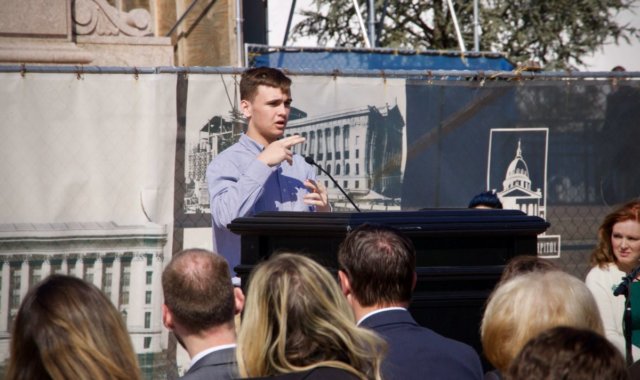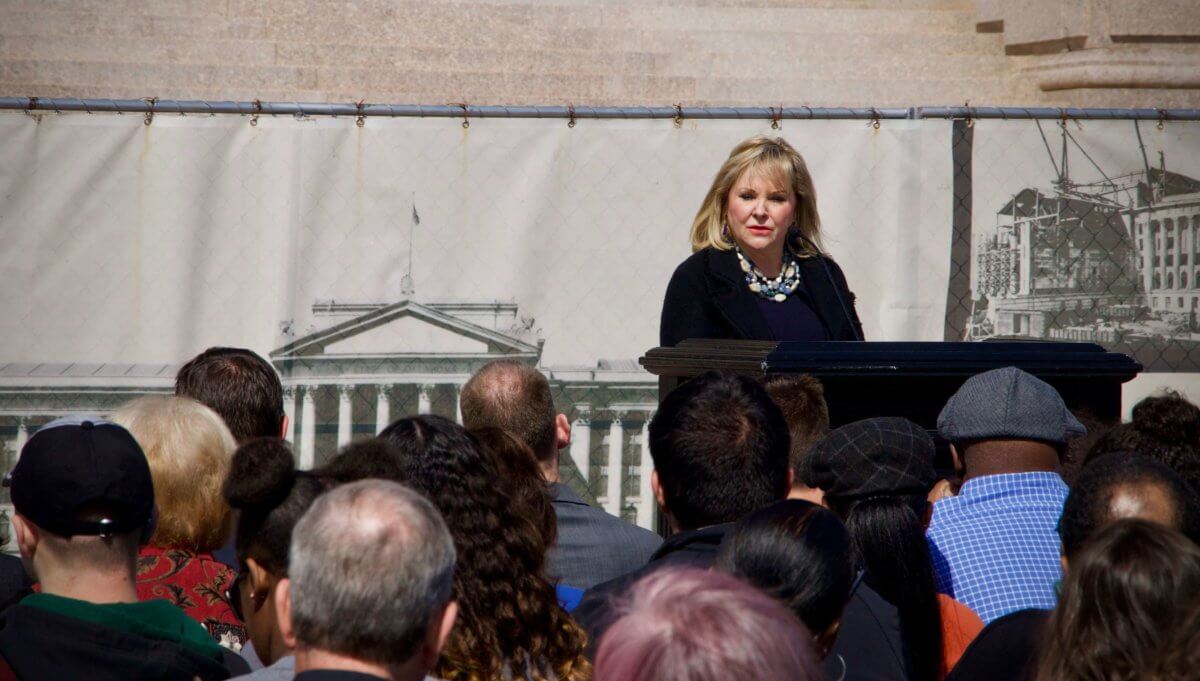

Parker Simpson is a freshman in high school. He makes straight A’s and is the starting quarterback of his football team. He’s on the academic team and hopes, one day, to be an electrical engineer.
Simpson also has major hearing loss in both of his ears and is one of the many students who attend the Oklahoma School for the Deaf in Sulphur.
At the Capitol last week, Simpson and other students from OSD gathered to raise awareness for individuals with disabilities for People with Disabilities Awareness Day in hopes of spreading a simple message: disabilities aren’t definitive.
“People with disabilities can succeed, work and do just about anything if you give them a chance,” said Larry Hawkins, superintendent of OSD.
According to a 2016 report, Oklahoma has one of the highest percentages of people with disabilities along with many states in the South. Gallaudet University estimated that 3.1 percent, or 71,442 individuals ages 18-64, are deaf in Oklahoma. This year marked the 24th consecutive year People with Disabilities Awareness Day had been held at the Capitol, and in 2018, supporters of both OSD and the Oklahoma School for the Blind hoped to converse with lawmakers about the expansion of employment resources for individuals with disabilities.
After Gov. Mary Fallin signed a proclamation declaring March 13 as People With Disabilities Day on the southern steps of the Capitol, Simpson delivered a speech about his struggles with hearing loss and the service that OSD provided that allowed him to succeed academically.
“As I got older, I noticed my hearing going down. I couldn’t hear as well, so I started failing my classes and I got straight F’s,” Simpson said. “I was told I was stupid, I was weak and I couldn’t do it. In all honesty, if I didn’t find [the Oklahoma School for the Deaf], I probably would’ve dropped out.”
Before Simpson attended OSD, he was enrolled in Duncan Public Schools and, with his gradual hearing loss, struggled in both sports and academics. He believed that he would simply “zone out” when he didn’t hear a coach’s play call or teachers’ instructions. When he was put in special needs because of his hearing loss, bullying, depression and hopelessness followed him until he discovered OSD.
“It was hard for me to make friends in public school,” Simpson said. “There, they just thought I was stupid and just put me in special needs.”
At OSD, students are bussed from around the state to a four-day school week curriculum. The school serves the entire state and busses anyone from pre-K to high school. The school currently has a 100 percent graduation rate and offers an Occupational Training Opportunities for the Deaf program that gives students hands-on experience in the professional world working at the trainee level. Assistant Superintendent Carolyne Paradiso said her daughter, who is also hearing impaired, has greatly benefited from the program and has obtained a job because of the program.
“I’ve sat and watched when Kathleen has gone in to put in a job application, and they’ve literally thrown it in the garbage,” Paradiso said. “The OTOD program is so critical because it gives them a chance to see they can work.”
Like other students at the school, Simpson has set his sights high and hopes to apply to MIT, the Rochester Institute of Technology and Gallaudet University, a Washington D.C.-based university that serves hard-of-hearing or deaf students. Above all, Simpson hopes people can be more accepting and understanding of people and their disabilities.
“We need to be held to the same status, but they’ve got to understand that we’re not going to be able to grasp everything they say,” Simpson said. “I hope the state realizes that the blind and deaf schools are very, very important.”

‘There aren’t enough bodies’
The Oklahoma School for the Deaf opened in 1908. Now, the institution caters to any child or adolescent in need of assistance as far away as the panhandle and provides deaf and hard-of-hearing students with dormitories and 24-hour onsite house parents. However, budget cuts have caused the institution to downsize.
One of the ways OSD tries to economize during Oklahoma’s uncertain budgetary situation is by assigning multiple roles to their staff.
“I’m the dean of students in addition to assistant superintendent,” Paradiso said. “Last week, we did a conference with the American Society for Deaf Children, and I put in 90 hours. There aren’t enough bodies.”
OSD receives 95 percent of its annual funding through state appropriations, but state dollars have decreased for the past two years. Noel Tyler, the director of the Oklahoma Department of Rehabilitation Services, says that although things are tight, the DRS is working to provide OSD and their constituents their necessary support.
“The last couple of years, we have had major concerns about our schools and their state appropriations. ” Tyler said. “We are holding our own.”
Paradiso says the school has braced every year for the worst, but the worst has yet to come and hopefully the program can find footing to become more extensive.
“We hope to expand in other areas of the state, but (…) we try to consolidate as long as we can to try to hold money,” Paradiso said. “I got into this business because of my children. We’re not there for the money.”




















